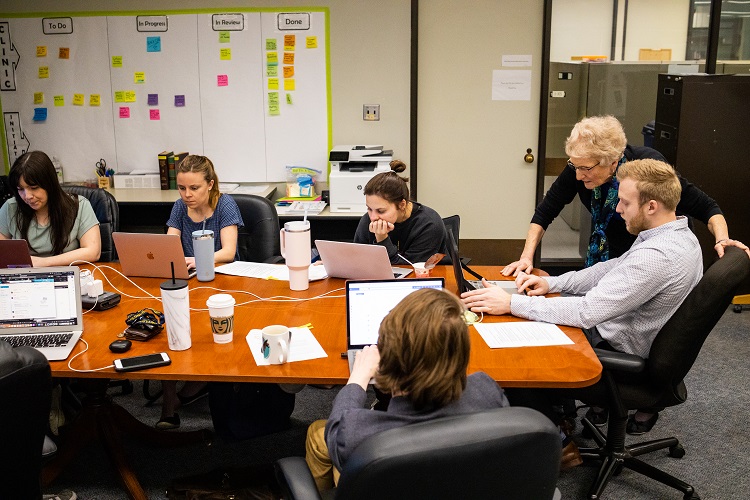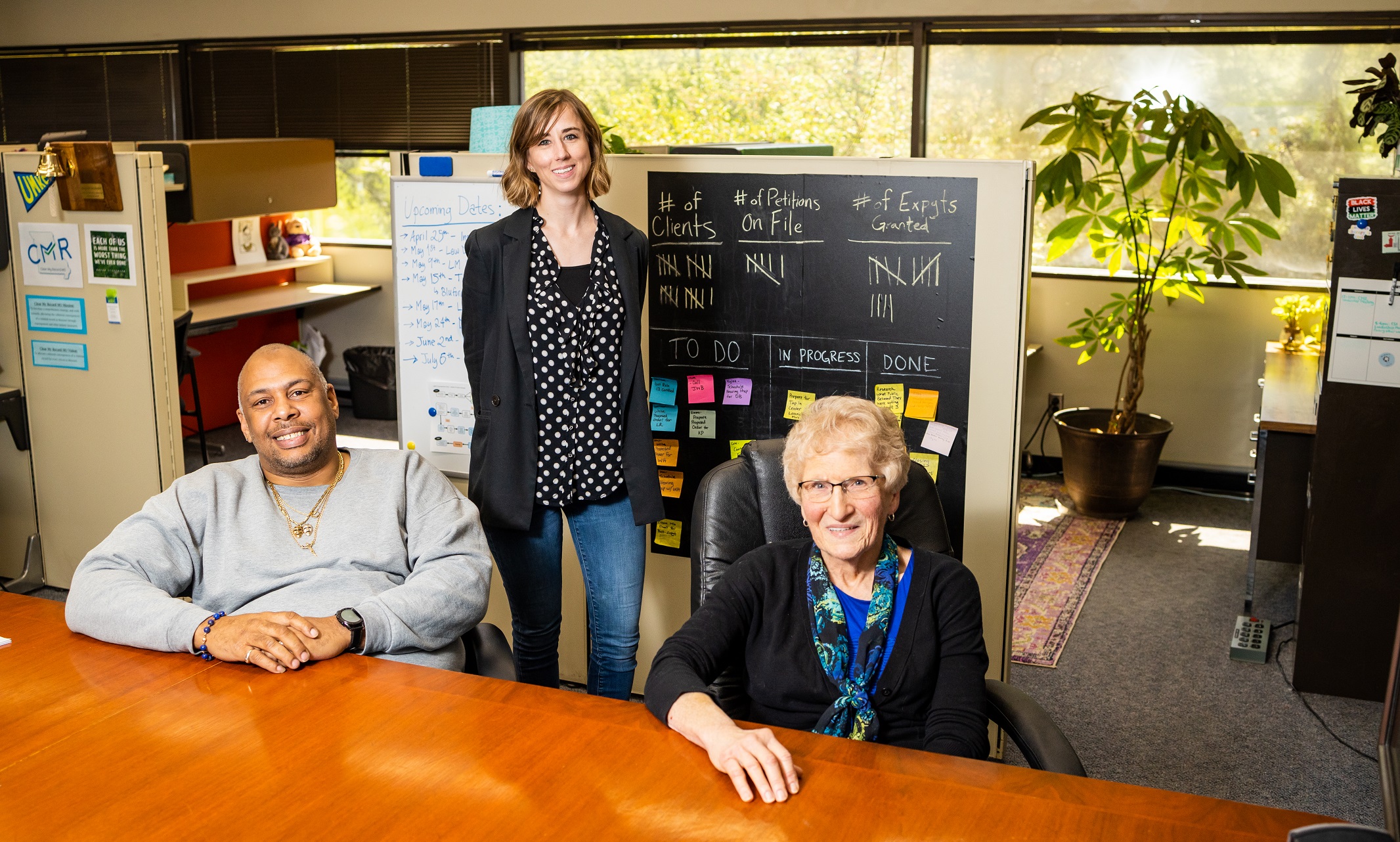When Johnny Waller, Jr., was 18 years old, he was tried, convicted and sent to prison in Nebraska. He served his time and returned to society, but quickly learned that although he was no longer behind bars, he also wasn’t truly free. Living with a criminal record was like carrying around a heavy weight all the time.
“It’s not like you can successfully reintegrate back into society like people tell you,” Waller says. “You’re lucky if you can find a decent job or a place to stay.”
When you have to check the box on every job or housing application that says you have been convicted of a crime, doors close. That’s why Waller has dedicated his career to helping people open those doors once again. Waller, who holds a bachelor's and master's degree, serves as program manager at the School of Law's Clear My Record Expungement Clinic.
The Clinic, founded in 2017 by retired law school dean, Ellen Suni, advocates for legislative changes to make expungement — the process of sealing past criminal records — more widely available in Missouri. The UMKC Expungement Clinic, which is affiliated with the project, represents low-income clients seeking expungement.
If someone qualifies under Missouri law, a judge can grant an expungement of their convictions. With their record cleared, past convictions will not show up during background checks and they need not disclose their convictions on applications.
“With the bang of a gavel, you can do all kinds of different things you couldn’t do before because you don’t have to check those boxes, ” Waller says.
Waller himself was granted an expungement in 2018, 22 years after his initial conviction. The decision opened opportunities for him to pursue his education, start a business and work as an advocate to ease the collateral damage he says too often follows people after they leave prison.
“Drug charges and theft offenses are the most common expungement cases at the UMKC Expungement Clinic,” says Sydney Ragsdale (J.D. ’18), a Truman Fellow who helps oversee the student lawyers who handle cases through the clinic.
The mission behind the Expungement Clinic’s work has less to do with the details of clients’ past convictions and focuses more on the burdens imposed by those convictions, even years after fines are paid or a prison sentence is completed.
“People are being wrongly held back from living their lives,” Ragsdale says.
Since UMKC’s clinic began, its student lawyers have successfully assisted nearly a dozen clients.
One such client is a man from New York who was caught with marijuana while passing through Missouri on a cross-country trip. That unfortunate pitstop led to a drug charge on his record and prevented him from getting a promotion he needed to support his family.
Another client couldn’t rent an apartment or secure a mortgage to buy a house because of a DUI conviction. That mistake from his past kept him struggling to survive in low-income housing.
A third client, a former childcare worker, had been charged with child endangerment after she momentarily left a student behind on a field trip. Although the child was unharmed, the mistake caused her to struggle both financially and emotionally for years afterward.
“She was out in the world doing her best,” Ragsdale says. “She loved these kids, but made a mistake most parents have made at some point in their lives.”
As with most clients the clinic represents, a mistake was still wreaking havoc on the woman’s life years later. Fortunately, like the man from New York with the drug charge and the man with the DUI conviction, she was granted an expungement and given the opportunity to finally start moving on.
“The collateral consequences of convictions are just brutal,” says Suni, who continues to oversee the Clear My Record Project and teaches student lawyers working for the clinic. “There are the obvious things; people have trouble getting jobs, housing, public benefits and loans. The consequences cut across all areas, such as a parent not being permitted to go on their kid’s school trip. It affects every aspect of their lives.”

When the Clear My Record Project started, Suni hoped the expungement process in Missouri could be almost automatic. She thought perhaps a computer program could efficiently find eligible clients and help push through the required paperwork to help them get a fresh start. But as quickly as that idea arose, it became clear that Missouri’s expungement statute, substantially revised in 2018, was written far too narrowly for such automation.
“The statute was very complex and confusing,” Suni recalls. “It became clear that this attempt to digitize the process to help people who don’t have lawyers wasn’t going to work.”
A key issue was finding anyone who met the law’s narrow qualifications. For example, only certain non-violent and non-sex crimes are eligible for expungement. Furthermore, the law allows for the expungement of only one felony in a lifetime, and only two misdemeanors. As the 2018 law was written, a person had to wait seven years after completing a felony-related sentence or three years after a misdemeanor before applying for expungement. Moreover, having a pending case, even for a traffic violation, or owing fines or fees can prevent obtaining expungement.
While hundreds of potential clients desperately needed a clean record to move forward, these strict requirements put expungement out of reach for most.
“We discovered that very few people were fully eligible,” Suni says.
Suni and others affiliated with the Clear My Record Project began using their experience with clients to push for changes that could open the process to more people and they’ve found some success. For example, the law was amended to shorten the waiting period to three years from seven for a felony, and to one year from three for a misdemeanor, and a few new crimes were made eligible.
Suni says the changes are an improvement, but more is needed. She and others across the state are advocating for additional legislative changes, including increasing the lifetime limit of convictions eligible for expungement to two felonies and three misdemeanors. Additional potential changes include providing more leeway for people who committed crimes between the ages of 16 and 25, and for those whose offenses occurred when they were addicted to drugs.
Advocates also are pushing for the abolishment of a $250 surcharge currently assessed to anyone seeking expungement. Ragsdale says that fee, on top of other required court fees, puts expungement out of reach for many low-income clients who earn too much to receive a fee waiver, but will still struggle just to pay for food and housing.
“It is way too expensive,” she says.
Down the road, advocates would like to see the expungement process in Missouri become automatic. Once someone qualifies under the law, the state would initiate the process with no lawyer or court filing required.
While advocates say the Missouri expungement process is still too complex and narrow, it has improved since UMKC’s clinic began. The clinic is seeing a bigger pool of qualified clients and the process is more efficient for hundreds of potential cases.
Of the dozen expungements obtained through UMKC’s clinic, ten of those were granted during the last six months. In January, four of the clinic’s clients obtained expungement on the same day.
“It was extremely exciting,” says Kylee Gomez, a third-year law student who works as a research assistant at the clinic. “Until that point, we’d only had one or two happen.”
“In every case, expungement is a second chance the client desperately needs,” says Bailey Baker, a second-year law student who also serves as a research assistant in the clinic.
“I’ve seen how deeply the past mistakes someone makes, particularly when they were younger, can haunt them,” added Baker, a former social worker. “Expungement is a way to move on.”
Some are hopeful for the future. Many of the provisions supported by the clinic passed both the Missouri House and Senate and will become law if signed by the governor.

